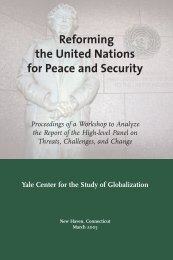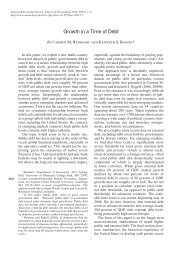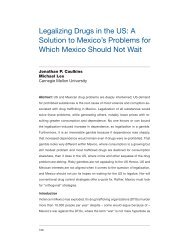The collapse of global trade, murky protectionism, and the crisis:
The collapse of global trade, murky protectionism, and the crisis:
The collapse of global trade, murky protectionism, and the crisis:
You also want an ePaper? Increase the reach of your titles
YUMPU automatically turns print PDFs into web optimized ePapers that Google loves.
15. Restoring <strong>trade</strong> finance: what <strong>the</strong> G20<br />
can do<br />
Marc Auboin<br />
WTO Secretariat<br />
Shrinking <strong>trade</strong> finance threatens living st<strong>and</strong>ards in both industrialised <strong>and</strong> developing<br />
countries. It reduces <strong>trade</strong> flows <strong>and</strong> thus adds to o<strong>the</strong>r deflationary pressures.<br />
<strong>The</strong> threat is all <strong>the</strong> greater in this <strong>crisis</strong> because international supply chains now<br />
extend to <strong>trade</strong> finance as well <strong>the</strong> production <strong>of</strong> parts <strong>and</strong> components.<br />
Sophisticated supply-chain financing operations – including for small <strong>and</strong> mediumsize<br />
companies – rely on a high-level <strong>of</strong> trust among suppliers; trust that <strong>the</strong>y will<br />
deliver <strong>the</strong>ir share <strong>of</strong> <strong>the</strong> value-added <strong>and</strong> have <strong>the</strong> necessary finance to produce <strong>and</strong><br />
export in a timely manner.<br />
What is <strong>the</strong> situation now?<br />
<strong>The</strong> <strong>global</strong> liquidity situation has been a major constraint in 2008 on <strong>the</strong> largest suppliers<br />
<strong>of</strong> <strong>trade</strong> finance. Trade credit has also been reduced by a general re-assessment<br />
<strong>of</strong> counter-party risk, <strong>and</strong> an increase in <strong>the</strong> expected payment defaults on <strong>trade</strong> operations.<br />
In <strong>the</strong> second half <strong>of</strong> 2008, <strong>the</strong> situation spread to developing country markets.<br />
<strong>The</strong> market gap initially appeared in Wall Street <strong>and</strong> London, as US <strong>and</strong> UK <strong>global</strong><br />
banks – particularly those with weak balance sheets – could not <strong>of</strong>f-load/refinance on<br />
<strong>the</strong>ir excess exposure in <strong>trade</strong> credits <strong>the</strong> secondary market. As a result, some banks<br />
were unable to meet <strong>the</strong> dem<strong>and</strong> from <strong>the</strong>ir customers for new <strong>trade</strong> operations, leaving<br />
a "market gap" estimated to be around $25 billion in November 2008 – out <strong>of</strong> a<br />
<strong>global</strong> market for <strong>trade</strong> finance estimated at some $10 trillion a year.<br />
More disturbing is <strong>the</strong> fact that large banks have reported on several occasions that<br />
<strong>the</strong> lack <strong>of</strong> financing capacity has made <strong>the</strong>m unable to finance <strong>trade</strong> operations.<br />
Some very large banks used to roll-over up to $20 billion in <strong>the</strong> secondary market per<br />
months are doing $200 million right now due to lack <strong>of</strong> counterparties. Dem<strong>and</strong> for<br />
<strong>trade</strong> credit is far from being satisfied, <strong>and</strong> prices for opening letters <strong>of</strong> credit far outweigh<br />
<strong>the</strong> normal re-assessment <strong>of</strong> risk according to market specialists.<br />
Fur<strong>the</strong>r, <strong>the</strong> liquidity problem, although cooling a bit in Asia, has since spread to<br />
o<strong>the</strong>r developing countries' money markets in South Asia, Africa, <strong>and</strong> Latin America.<br />
This adds to <strong>the</strong> problems faced by local banks in certain developing countries even<br />
in normal circumstances such as lack <strong>of</strong> deep money markets, lack <strong>of</strong> capacity to h<strong>and</strong>le<br />
large volumes <strong>of</strong> <strong>trade</strong> credit, lack <strong>of</strong> reliable information on <strong>the</strong> creditworthiness<br />
<strong>of</strong> customers, all <strong>of</strong> which lead, in periods <strong>of</strong> <strong>crisis</strong>, to difficulties in finding partners<br />
in developed countries to accept <strong>the</strong> counterparty risk.<br />
75





